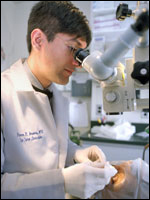Glaucoma Diagnosis
Regular eye exams are important, given that an early glaucoma diagnosis can help to prevent vision loss.
For people with the disease, the best way to prevent vision loss is with an early glaucoma diagnosis and treatment.
 Glaucoma diagnosis
Glaucoma diagnosis
You should see your eye care professional at least every two years for an examination. People at high risk for glaucoma due to the following risk factors may need to be examined more frequently:
- High intraocular pressure (IOP)
- Family history of glaucoma
- African-American or Hispanic race (open-angle glaucoma is much more common amongst African-Americans)
- Existing optic nerve damage
A glaucoma diagnosis involves detecting ocular tissue damage due to elevated IOP. To test for glaucoma, your Henry Ford ophthalmologist will conduct a comprehensive eye exam that includes:
- A simple and painless procedure called tonometry, which measures the internal pressure of the eye
- Review of optic nerve health
- Measure of field of vision
Your ophthalmologist also may consider other imaging tests to assess optic nerve damage and confirm a glaucoma diagnosis.
What to expect during your glaucoma eye exam
The average glaucoma eye exam lasts 1.5 to 2 hours. At the Henry Ford Department of Ophthalmology, we make every effort to follow our patients’ scheduled times. For the convenience of our other patients, please call us if you will be delayed or give us 24-hour notice if you need to reschedule your appointment.
During your glaucoma eye exam:
- You will be asked to complete several forms to provide us with basic information about you, your eyes, your medical history and your insurance coverage. Our staff will assist you in completing the forms, if necessary.
- One of our ophthalmic technicians will review the reason for your glaucoma eye exam and take some preliminary measurements of your eyes and your eyesight. The technician also will instill eye drops to dilate your pupils. It takes about 20-30 minutes for your pupils to fully dilate after the drops have been given.
- When your pupils are fully dilated, your ophthalmologist will perform a comprehensive exam and will be happy to answer any questions about your eye condition or treatment.
- A complete report of your consultation and any test results will be sent to both your optometrist and primary care doctor.
Please bring the following with you to your glaucoma eye exam:
- Your eyeglasses
- A list of medications you take (including eye drops)
- The name, address and phone number of your optometrist and primary care doctor
- Insurance coverage information or HMO/PPO referral forms
- Someone to drive you home after your appointment
- If you’ve been diagnosed with glaucoma, previous eye exam or visual field records
At Henry Ford, patients come first.
The Henry Ford Department of Ophthalmology is committed to providing our patients with compassionate, personalized care. We feature the most advanced treatments in eye care and are dedicated to vision research – always staying at the forefront of innovation. A leader in Michigan, as well as one of the largest ophthalmology practices in the United States, we treat more than 55,000 patients per year at 12 locations throughout southeast Michigan. In addition, our team works closely with Henry Ford Medical Group physicians in other departments, providing multidisciplinary, coordinated care for those patients who need it.
.svg?iar=0&hash=F6049510E33E4E6D8196C26CCC0A64A4)

/hfh-logo-main--white.svg?iar=0&hash=ED491CBFADFB7670FAE94559C98D7798)